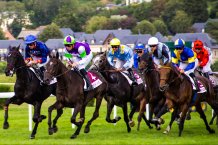Articles

This is the first in-depth study which attempts to estimate maternal and paternal age effects specifically for speed in thoroughbred horses
Parental age could be key factor in helping thoroughbred horses be first past the post
In a sport where the finest of margins can determine the winner, a new study has shown that parental age can be a determining factor in who comes out on top in horse races.
Experts from the University of Exeter have shown that the speed of thoroughbred horses declines as parental age at conception increases. The research team analysed more than 900,000 race performances from more than 100,000 racehorses from races across Great Britain.
They found that the age of both the mothers and fathers of the horses played a significant role in the overall speed of the racehorses.
The researchers believe the study can play a pivotal part not only in optimising racehorse breeding, but crucially offers further evidence that parental age can affect offspring characteristics.
The study is published in the journal Royal Society Open Science on Wednesday, October 5th 2022.
Dr Patrick Sharman, Postdoctoral Research Associate (Visiting) from the Centre for Ecology and Conservation at the University of Exeter’s Penryn Campus in Cornwall said: “The fact that parental age affects racehorse speed should be of interest to the horseracing industry.
More generally, it adds to an increasing body of evidence which points towards parental ‘state’ at the time of conception having an influence on offspring phenotype. This would have implications well beyond racehorses and the horseracing industry”
The effects that parental age can have on the characteristics of their offspring has been studied in a number of species in recent years. However, this is the first in-depth study which attempts to estimate maternal and paternal age effects specifically for speed in thoroughbred horses.
The study analysed data from almost 25 years of racing results, from 1996-2019, from meetings across Great Britain. Their data included offspring of 41,107 mothers and 2,887 fathers. They found a ‘significant effect’ of maternal age on speed, with each additional year of age at conception decreasing the offspring speed by 0.017 yards per second.
Whilst this may sound modest, it actually converts into a predicted difference of approximately one second over a race of one mile between, by way of example, a five-year-old and a 15-year-old mother. Intriguingly, the paternal age also showed a decrease of 0.011 yards per second for every increasing year in stallion age – a key finding since thoroughbred stallions play no active involvement in parental care.
Dr Sharman added: “It is perhaps not surprising that offspring speed declines with increasing maternal age. It is the dams, after all, who care for the foal, first in utero, and then through to around 6 months of age.
“What I find fascinating, though, is that increasing paternal age also causes a significant decline in racehorse speed. Thoroughbred stallions play no part whatsoever is raising a foal, so what is behind this decline in speed?”
The team say that further research is now required to determine the mechanisms underlying this phenomenon.
Evidence of maternal and paternal age effects on speed in thoroughbred racehorses is published in Royal Society Open Science.
Date: 5 October 2022
